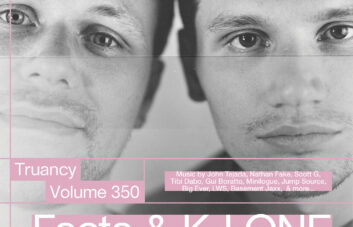The flux of tempo trends is one of the most fascinating narratives woven into the overarching chronology of dance music. At times steady and predictable, at other times erratic and unexpected, the constant push and pull between high and low BPM’s yields such microcosmic – and ultimately volatile – scenes as moombahton and juke. One trend that seems to have recently proven its longevity in the “here today, gone tomorrow” music world, though, is slow-mo house. You could easily make the claim that a lot of disco and deep house has always favored the lower end of the tempo spectrum, but it’s really only been within the past couple years that the gospel of below-120 has spread to the larger diaspora of dance styles. Artists as diverse as Julio Bashmore, Jacques Green, FaltyDL, and Nicolas Jaar have all integrated lower BPM’s into their productions while still maintaining clear dancefloor influences and intentions. Applying this loosened tempo sensibility to the current renaissance of early house and techno sounds – and backed with a remix from Objekt and a Wire mix – freshly-minted duo Call Super have hit a grand slam with their forthcoming Staircase EP on Five Easy Pieces.
Call Super is the production moniker of JR Seaton and Matt Waites, two producers boasting stacked credentials that have somehow flown under the radar of public consciousness. In addition to co-founding Berlin-based label Nocturne, Seaton has put out three EPs on Relish Recordings in the past year, exploring the intersection between disco/funk sounds and mechanical, techno-driven influences. Waites, meanwhile, has gained a devoted following for his consistently stellar work behind the decks at influential London clubs such as Plastic People and Fabric, and he’s also been responsible for a string of highly acclaimed solo and collaborative releases since 2006.
“And It Was!” kicks off the Staircase EP with some moody 118 BPM vibes, featuring a dark, propulsive bass line informed heavily by Chicago house. Slightly obscured vocals, squiggly acid synths, and motoric percussion carry the track into its first climax, marked by an eruption of slowly downward-bending organ wails. After a short breakdown, it crescendos once again into a maelstrom of unrestrained hi-hats and a main synth line with a couple screws loose. A clever outro full of white noise and cacophonous synth drones convincingly makes the track sound like it reached a state of total entropy or, alternatively, crumbled away at its foundation. “Nosebleed” picks up the pieces and assembles them into a similarly tight framework that’s more of a nod to disco than Chicago house. The disco influence becomes obvious around the 1:30 mark, with the arrival of cheeky analog stabs and a bass line reminiscent of Art Department or Andy Butler’s solo work. Refusing to settle into a groove for too long, Call Super recruit warm, dynamic synth chords and a percolating arpeggio pattern to transform the track from a stormy slow-burner into a downright blissful late-night affair. “Nosebleed” is groovy enough to get your whole body moving but edgy enough to not sound cheesy at any point, making it a perfect companion for the hot weather and cold beer at your summer parties. “Timora” is definitely the wildcard track on this EP, clocking in at 130 BPM and lacking the obvious disco and house influences present on “And It Was!” and “Nosebleed.” Waites and Seaton alchemically fuse together elements of diverse genres, demonstrating their comprehensive knowledge of both music history as well as production processes. The rhythms are perplexing (to say the least) in terms of their stylistic references. A host of unsyncopated 808 drum programming points towards a strong electro influence, but the on-the-three snare hits are more suggestive of dub/dubstep and the frantic shuffles during the intro and breakdown hint at the futuristic sounds evangelized by the Night Slugs roster. “Timora” is also hard to pin down melodically-speaking, with twinkling synth arks heavily steeped in minimal techno sharing space with amorphous pads and a melancholy synth pattern drawn more from ambient house. Despite these references to niche genres that many of our readers may not be crazy about, this track sounds hyper-current and really transcends genre comparisons.
On the remix tip, Call Super’s Wire mix stretches out “Nosebleed” close to the eight-minute mark in a cosmic re-working that revolves around the immaculate arpeggiator work from the original track. The edginess of the original is buried beneath multiple layers of spacey atmospherics and loads of reverb, but if you like deep, chilled-out disco house this will satisfy your taste buds. Objekt, the prolific yet frustratingly-elusive producer we love, takes his remix in the opposite direction, adding some heft and grit to “Timora.” The street-ready percussion barrels towards you at breakneck speed, while tense, grainy synth lines suppress the original melody’s attempts to reach the surface. Objekt’s remix is exhausting and relentlessly chaotic, sounding like it could slip over the edge at any moment, but it’s a brilliant production that’s not to be missed.
Call Super – Staircase EP (Five Easy Pieces) is out soon.





1 thought on “Review: Call Super – Staircase EP”
Comments are closed.